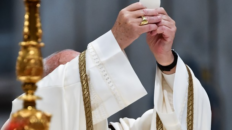Should we pray for those who die in grave sin and could have been condemned?
What will happen to someone who suddenly dies without confession?
It is established that men die only once and then comes judgment (Heb 9:27). And in this particular judgment, everyone receives according to what he did during his mortal life (2 Cor 5, 10).
Christian doctrine has always said clearly that everyone will reap in eternity what in this temporal life he will have sown.
First of all, let us keep in mind a great truth: “God does not predestinate anyone to Hell” (Catechism 1037). The Will of God is that all men come to enjoy salvation, of the Beatific Vision.
For someone to really be condemned, it is necessary for him to have a voluntary separation from God, a permanent aversion to Him, a rebellion against his will or a confrontation against him and, in addition, to persist in this attitude until the last day (Mt 7, 23; Mt 25, 41). People like that, people who meet these conditions, I really do not think there are many.
In any case, he who dies in mortal sin, without at least repenting, goes to hell (Catechism 1033). And Catholic Christian theology affirms that a condemned soul can not be saved with prayers.
But one thing is the irreversibility of the eternal destiny called hell (Catechism 1035), carved in earthly temporality, and another very different is, of course, to give someone already for the condemned in hell.
It is not possible to think or affirm categorically that someone, upon dying suddenly, and according to us without a state of grace, has been condemned inexorably. No one should ever think this or the most abject of criminals.
Why is it not possible to think about it? We know what is the ordinary way to enter heaven directly or indirectly (through purgatory): Dying in a state of grace. However, there is a possibility of salvation for the person who, being in grave sin, dies without being reconciled with God through the sacrament of confession; although, of course, I have to go through purgatory anyway.
This exception is based on several elements:
1.- When the person, at the time of death, could not be attended by a priest. Suppose the case of a plane crash or a car accident, could God condemn these people for having died without the presence of a priest, if they had had it, perhaps they would have resorted to it? Certainly not.
In these circumstances the Church believes in the Mercy of the Lord for those people who with their last breath of life cry for forgiveness. If the person has a moment of lucidity before death, and in that moment he repents with a contrite heart for the totality of his sins, and asks God for forgiveness, he will be saved.
2.- Let us remember that death is a gradual process from present life to apparent death (for example, clinical death), and from death to actual death. Apparent death does not always coincide with actual death, since death is the separation of the soul from the body, and it is difficult to point out the exact and precise moment of this separation. There have been cases of return to life after a clinical death by miraculous action.
There are testimonies of apparently dead people who later stated that they could hear what was going on around them. For this reason, in the event of doubt as to whether a person is dead or not, the Priest can act to administer the Sacrament of Anointing of the Sick (canon 1005) if it is believed that the person wanted it and / or asked the less implicitly (Canon 1006). “The Anointing of the Sick” is not a sacrament only for those who are about to die.
Therefore, it is considered an opportune time to receive it when the faithful person begins to be in danger due to illness or old age “(Catechism 1514). This sacrament must be administered, since one of its effects is the forgiveness of sins, even serious ones when the patient has not been able to confess and is unable to do so; in this case it is enough for the person to have performed an act of attrition.
3.- In this same line, when a person is in danger of death, and can not express himself verbally for any reason (for example in a coma), he can be absolved of the sins in a conditional way. This means that absolution is conditional on the dispositions of the sick person or presumed to be conscious (Canon 976).
The absolution will be given ‘under condition’ when, if it were given absolute, the sacrament would be exposed to danger of nullity, and if it were denied, the salvation of the penitent would be exposed in grave danger. The priest will proceed in this way when in doubt that the person is alive or dead; if there is doubt about the use of reason (for example in the insane or in children); when it is doubted whether a prior absolute acquittal has been granted; etc..
4.- We can not judge and condemn anyone, even when the Church has declared excommunication. The fact that a person is excommunicated does not mean that he is irremediably condemned to hell, it simply states that this person has left on his own foot the communion of the Church. The Church does not condemn anyone; He can not and must not decree the condemnation of anyone. A person who is excommunicated and, therefore, can not access the sacraments at the time of death, could repent of their sins and could be enough to save them. God’s mercy is so great and spectacular.
5. Nor are those who are unaware of the gospel of Christ and his Church without salvation, “because those who do not blame the gospel of Christ and his Church without guilt, but seek God with a sincere heart and try in their lives, with the help of grace, doing the will of God, known through what your conscience tells you, can achieve eternal salvation (Vatican II, LG 16) “.
6.- We must not forget that God is omniscient and knows everything, even before it happens. It is quite possible that He, seeing from eternity the prayer of his children for themselves or for others (for example the prayer of a mother), may have poured out graces that moved them to conversion before they died. Only God knows if at the last moment someone had repented of what he had done (with eliminating love for God and neighbor).
If this happens and / or that person has confessed with his mouth that Jesus is Lord and believes in his heart that God has raised him from the dead, he will be saved (Rom 10: 9). And even the simple attrition is enough to be saved, although it has less merit and therefore more purgatory. There have been cases of atheists who, when they saw themselves close to death, prayed. Someone has said that “when a man takes a step towards God, God takes more steps towards man”.
7 .- Even in cases where everything seems to suggest that someone has died in serious sin, do not assume that is already condemned, because the last word always has God . Only He knows the circumstances and intentions of each and only He knows what really happened during the last moments of life. Even in the case of suicides we can not be sure of their condemnation.
8 .- It is not easy to know if who has sinned seriously, has done so with full knowledge and deliberate consent, as required to have a mortal sin. And even supposing that there is mortal sin (that is, serious, conscious and free), we can not deny that ‘the finger’ of God could have touched the sinner at the time of death if in that supreme moment the person has turned his gaze to He with a repentant heart.
9.- At the moment of the death of someone we do not know, for example, what was in his heart in relation to God, we do not know if he had serious intention to confess (with an act of contrition included) even though in the end he could not to confess; We do not know if that person had made a prayer in previous moments … In short, we do not know by what ways souls can reach the action of God’s merciful, who through Jesus knows that his interest is to find the lost sheep to save it.
Jesus’ mission was never to condemn, but to save (Jn 3:17); Jesus wants to fulfill the will of the Father: that none of those he has entrusted to him should be lost (Jn 6, 39). “In the same way, it is not the will of your heavenly Father that one of these little ones be lost” (Mt 18, 14).
He, who scrutinizes hearts, will save what can be saved. What seems impossible to us, for God is not; “Because nothing is impossible for God” (Lk 1, 37). “What seems impossible for men is possible for God” (Mt 19, 26).
10. The Church does not exclude from her prayers any faithful deceased. The love of the Church for her children is universal. And in every Eucharist the Church prays for all without exception. Prayer is an expression of hope and trust in divine justice and mercy.
To pray for all is to hope that God, in the ways that only he knows, can lead many to himself. Even for those who, according to human criteria, could be condemned, because we should never forget that the criteria and thoughts of God do not always coincide with those of the human being (Is 55, 8).
This universal or catholic love of the Church, which is a mother, is manifested in her prayers for her deceased children, especially the day of a funeral and the day of all the deceased faithful (November 2).
At each Mass the Church prays “for our brothers who slept with the hope of the resurrection”, asking God to admit to contemplate the light of his face “to all the deceased”. Prayer for the known deceased is important, but all the other deceased are not forgotten. Prayers for the eternal rest of the deceased are not only pleasing to God, but can help them.
Our duty as Christians is to pray for those who have died waiting for the mercy of God to reach them . We should not deny our prayers to anyone, even for the soul of someone who, according to our logic, does not deserve our prayer or consider prayer for that soul to be useless.
And even in the supposed case that some person had been condemned, prayer is not time or effort lost, it will serve other souls . If we pray for a soul that has already left Purgatory or for someone who has been condemned, that prayer is not wasted, God knows to whom it could benefit. It is something similar to the principle of communicating vessels thanks to the communion of the saints: God transfuses and channels the prayers to the souls that need it most.
If they are in purgatory, we know that they will no longer go to hell. We can help those souls in purgatory as consolation and companionship in that place where purification is ‘suffered’; and we can do it with our prayers of suffrage, particularly by participating in Holy Mass and also by having Holy Mass celebrated for them, with works of dependence and charity, with Indulgences, sacrifices, etc.
In addition, prayer has another important effect that many ignore: retro prayer feeds. So if we pray for someone, at the same time we are helping ourselves because their spiritual effect makes us more sensitive to the mysteries of God and more willing to fulfill his will.
After the death of someone we can only influence their ‘temporary’ reality that we call purgatory in which there is the vast majority of faithful departed, although we never know with great detail how it is or how long ‘time’ lasts. It is only known that, this antechamber of heaven, is a ‘place’ of purification to be worthy to be in the presence of God to see face to face as it is (1Jn 3, 2).





Add comment